Lectures and learning with thought provoking ideas and conversations.
| 2019 Q2 | story by Liz Weslander | photos by Steven Hertzog
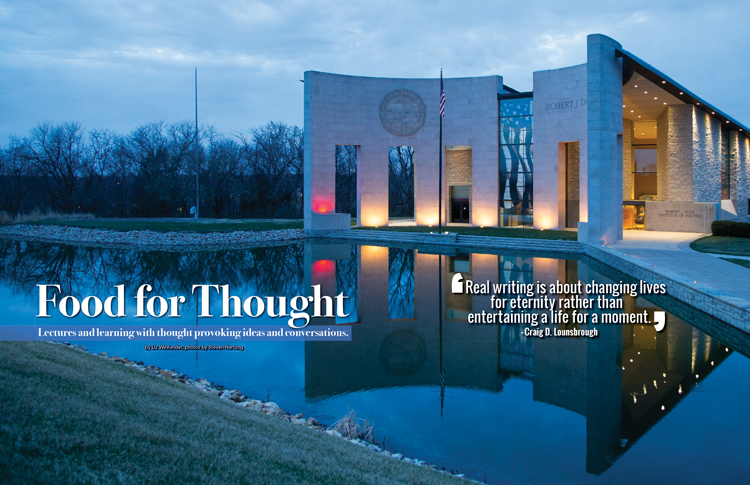
Dole Center
On a recent chilly April evening, Jesmyn Ward, author and National Book Award winner, stood on the stage at Liberty Hall in front of a crowd of eager attendees. She talked solemnly about the intersection of race and parenting in her own life, and how storytelling is part of what helps people heal from the pain that comes from living in the world. When she finished, the audience asked questions about the fate of various characters from her novels, the state of racism is the U.S., and what books she would recommend for high school students.
Ward’s talk was part of the University of Kansas (KU) Hall Center for the Humanities Lecture Series, an annual series of five to six speakers that has been taking place in Lawrence since 1947. The lecture was a reminder that, while sometimes it’s nice to just sit back and be entertained, leisure activities that provide food for thought are also an important component of a thriving community. Whether the subject is literature, science, politics or even simply how to best utilize local resources, Lawrence provides a feast of opportunities for those looking to feed their minds. Even better, a lot of these opportunities, including the Hall Center Lecture Series, cost nothing to attend.
Sarah Bishop, associate director of the Hall Center for the Humanities, says
Ward’s lecture exemplified what the center looks for when selecting speakers for the series.
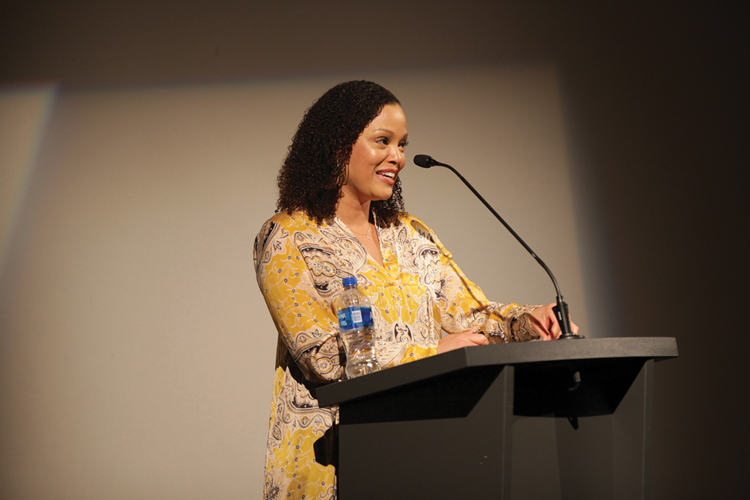
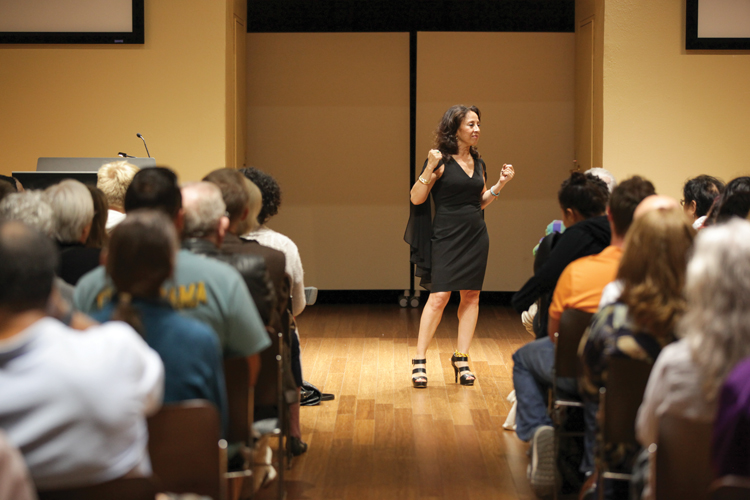
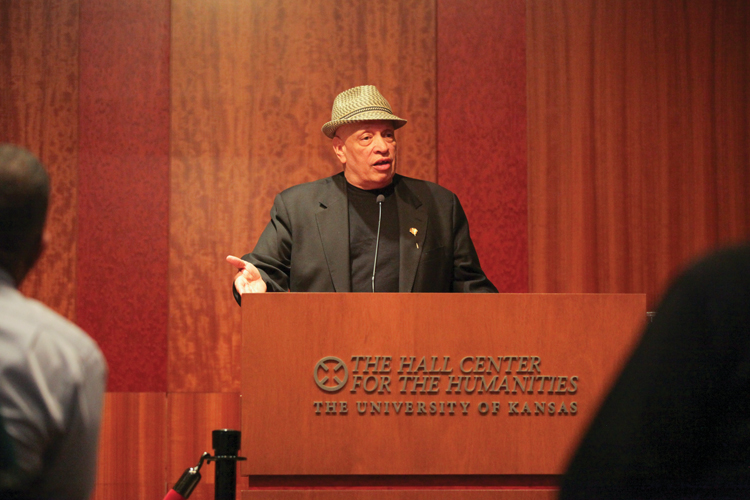 Marie Grace Brown, Maria Hinojosa, and Walter Mosley speaking at the Hall Center for the Humanities.
Marie Grace Brown, Maria Hinojosa, and Walter Mosley speaking at the Hall Center for the Humanities.
Photos by Ann Dean
“When we are selecting a speaker, we are looking for someone who will help us think critically about the issue that they are speaking about,” Bishop says. “We are also always looking for people who not only represent diversity in ideas and thought, but can appeal to diverse audiences. Jesmyn is a creative writer, but her work certainly speaks to contemporary politics, as well as environmental and social issues.”
Another lecturer in this year’s Hall Center for the Humanities lecture series was Maria Hinojosa, an Emmy award-winning news anchor and journalist, who spoke on the unique challenges that Latinx women face during immigration and how journalists can represent immigrants more justly in the media. Last November, the center brought in the popular fiction writer Neil Gaiman, who drew a crowd that filled the 2,000-seat Lied Center.
In November, Emmy Award-winning actor, writer and director Alan Alda will speak about the ways in which people can use the humanities and storytelling to better communicate detailed and innovative scientific discoveries, which is the focus of the Alan Alda Center for Communicating Science at Stony Brook University.
“The humanities are so important for thinking about the ways that humans live and create culture,” Bishop says. “By having a critical eye toward the culture we are creating, we can also look to the future and ask what we can do to improve our human societies and culture so that they are more equal and fair and just.”
In an effort to broaden the reach of humanities programming, the Hall Center recently launched a new initiative called Humanities in the Wild that will occur every final Friday from 6 to 8 p.m. at Sunflower Outdoor & Bike Shop, 804 Massachusetts St.
“The idea behind it is to bring humanities scholars to Downtown Lawrence and get them engaging our community in conversations about the humanities’ relationship to nature and wilderness, and how we can use history, literature and communications, and other traditional academic disciplines to open our eyes to our relationship to nature and the wild,” Bishop says.
The presentation on Friday, May 31, features local naturalist Ken Lassman, talking about how people can look and listen for nature in unlikely places, such as Downtown Lawrence. On Friday, June 28, University of Kansas associate professor of film and media studies Germaine Halegoua shares interactive cycling crash maps of Lawrence that she has created. In addition to engaging information, the Humanities in the Wild event features free beer from Free State Brewery.
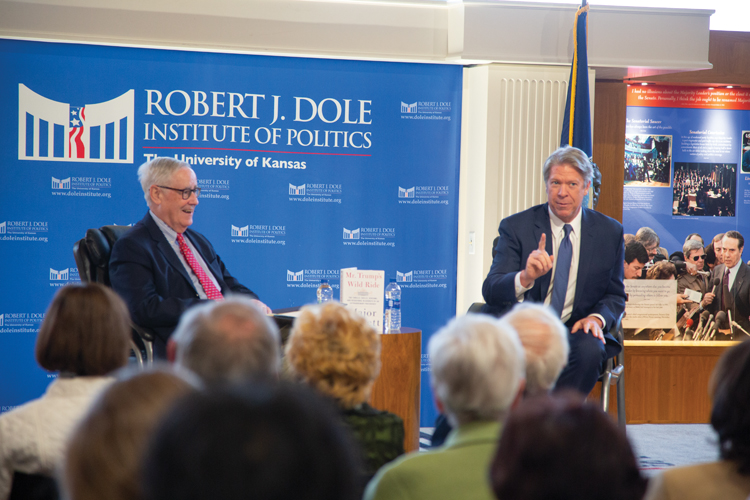
Guest speaker Major Garrett, Chief Washington Correspondent, gives a talk and a Q&A moderated by the Director of the Dole Center Bill Lacy
Another local entity offering programming meant to spark critical thinking is the Robert J. Dole Institute of Politics. Director Bill Lacy says the Dole Institute takes a bipartisan and philosophically balanced approach when developing the various lectures and forums presented throughout year, and all of its programming has the underlying mission of fostering civility when discussing politics.
“We are just trying to train young people and convince adults to keep an open mind, to listen to the other side and to understand why they believe what they believe rather than just getting up everyday, reading some assigned talking points and going out and parroting those to the world,” Lacy explains.
While bipartisanship is always important, he says it is especially critical to have programming that fosters this ideal given the nation’s current political climate.
“It’s probably the worst that I recall in my experience,” Lacy says. “You can go back to the ’60s, when there was a lot of controversy and a lot of disagreement on issues like Civil Rights and Vietnam, but those issues were not always cleaving by party. Right now, everything is just split on party lines, and we have reached the point where we don’t even want to talk to the other side; it’s very bitter.”
The Dole Institute’s programming, which is all free and open to the public, covers more than just contemporary politics, Lacy says. History, business, journalism and leadership are also common topics. He says the majority of the Institute’s events follow an interview format rather than a straight lecture style.
“We find that both the speakers and attendees love the interview style,” he explains.
“The speakers love it because they don’t have to prepare remarks and are not on the hook to get up and talk for 50 minutes. Our attendees love it because they get to hear from the speaker about a variety of subjects.”
The 2019 Dole Lecture, which occurred in April, featured former presidential candidate and Hewlett Packard CEO Carly Fiorina, who shared reflections and leadership lessons gleaned from her long career in both for-profit and nonprofit settings. The Dole Institute also just finished up a Spring Book Series that included journalist Major Garrett, who has covered four presidencies for three news outlets and currently serves as the chief Washington correspondent for CBS News. Garrett was promoting his latest book, “Mr. Trump’s Wild Ride,” and spoke to a standing-room-only crowd about the Trump presidency and other highlights of his journalism career.
Lacy says another unique aspect of the Dole Institute’s programming is that although it often brings in well-known names, it does not pay honorariums to speakers.
“The people who come here do it because they want to interact with students, or they want to give back to KU, or they just like the opportunity to share their thoughts with other Americans, and we are very proud of that,” Lacy says.
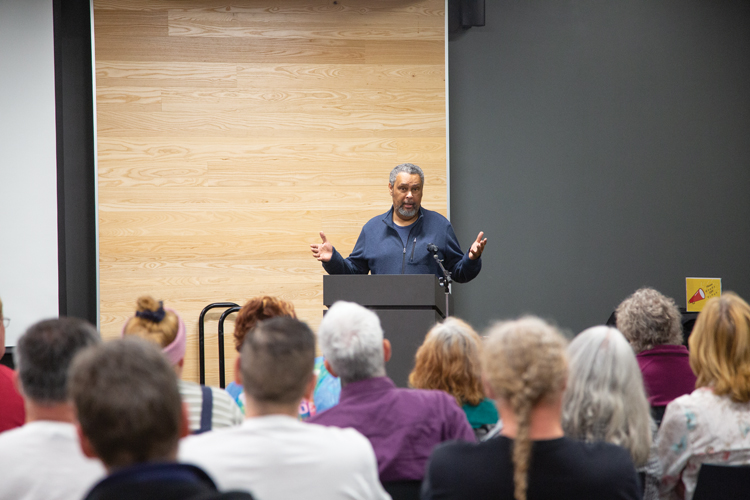
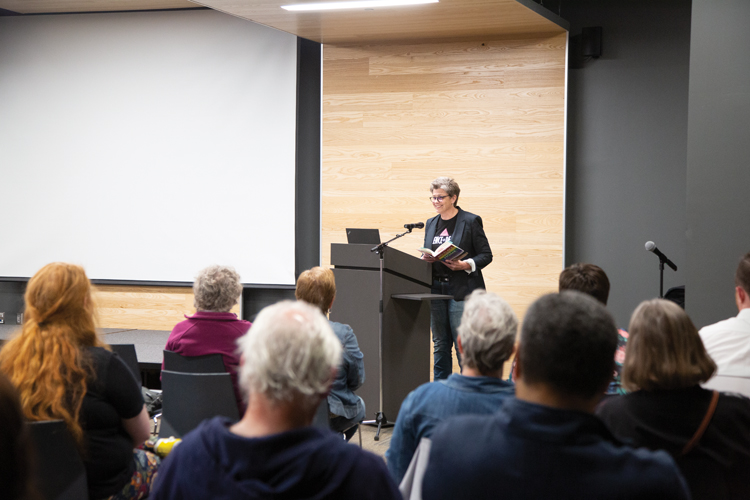 Academy Award winning writer and filmmaker Kevin Wilmott speaks to an audience at the Lawrence Public Library C.J. Janovy, author of No Place Like Home speaks to an audience at LPL
Academy Award winning writer and filmmaker Kevin Wilmott speaks to an audience at the Lawrence Public Library C.J. Janovy, author of No Place Like Home speaks to an audience at LPL
When it comes to free and informative entertainment, the Lawrence Public Library (LPL) is also full of options. Regular author talks, film screenings with discussions, and the ongoing Diverse Dialogues series—a partnership with KU’s Langston Hughes Center that explores topics surround issues of race and culture—are just a few of the examples of events that regularly fill the library’s calendar.
“The author events tie in to the library’s overall mission of promoting literacy, not just children’s literacy but adult literacy and leisure reading,” says LPL events coordinator Kristin Soper. “The Diverse Dialogues is a partnership that has worked out very well for us in sparking some of those kind of difficult community discussions in a safe place.”
In addition to the literature, cinema and social justice programming, the library’s Information Services Department also works to provide a variety of news-you-can-use events.
“The mission of our department is to connect people to information they need, so we try to keep track of things that are happening in the community and current events to guide our programming,” Information Services coordinator
Melissa Fisher Isaacs says. “Another part of our mission with our programming is to connect people to community resources, so we help provide a platform for other organizations to raise awareness of their programming and resources.”
In recent months, the library’s information-driven programming has addressed subjects ranging from digital privacy, fake news and small business tax basics to beekeeping, houseplant care and cooking on a budget. A past civics series featured speakers from the city, state and federal levels of government who all spoke about how citizens could get involved at each of those levels.
“The thing that we’ve learned is that people have lifelong learning needs,” Fisher Isaacs says. “I think Lawrence is really special in that there is so much expertise here, and we are an avenue of sharing that to a larger audience without people having have to pay tuition or commit to a degree program. They can come to the library and continue grow, develop and connect with community.”
